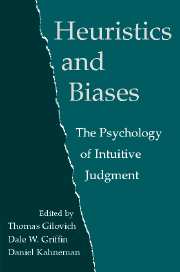Book contents
- Frontmatter
- Contents
- List of Contributors
- Preface
- Introduction – Heuristics and Biases: Then and Now
- PART ONE THEORETICAL AND EMPIRICAL EXTENSIONS
- PART TWO NEW THEORETICAL DIRECTIONS
- 22 Two Systems of Reasoning
- 23 The Affect Heuristic
- 24 Individual Differences in Reasoning: Implications for the Rationality Debate?
- 25 Support Theory: A Nonextensional Representation of Subjective Probability
- 26 Unpacking, Repacking, and Anchoring: Advances in Support Theory
- 27 Remarks on Support Theory: Recent Advances and Future Directions
- 28 The Use of Statistical Heuristics in Everyday Inductive Reasoning
- 29 Feelings as Information: Moods Influence Judgments and Processing Strategies
- 30 Automated Choice Heuristics
- 31 How Good Are Fast and Frugal Heuristics?
- 32 Intuitive Politicians, Theologians, and Prosecutors: Exploring the Empirical Implications of Deviant Functionalist Metaphors
- PART THREE REAL-WORLD APPLICATIONS
- References
- Index
32 - Intuitive Politicians, Theologians, and Prosecutors: Exploring the Empirical Implications of Deviant Functionalist Metaphors
from PART TWO - NEW THEORETICAL DIRECTIONS
Published online by Cambridge University Press: 05 June 2012
- Frontmatter
- Contents
- List of Contributors
- Preface
- Introduction – Heuristics and Biases: Then and Now
- PART ONE THEORETICAL AND EMPIRICAL EXTENSIONS
- PART TWO NEW THEORETICAL DIRECTIONS
- 22 Two Systems of Reasoning
- 23 The Affect Heuristic
- 24 Individual Differences in Reasoning: Implications for the Rationality Debate?
- 25 Support Theory: A Nonextensional Representation of Subjective Probability
- 26 Unpacking, Repacking, and Anchoring: Advances in Support Theory
- 27 Remarks on Support Theory: Recent Advances and Future Directions
- 28 The Use of Statistical Heuristics in Everyday Inductive Reasoning
- 29 Feelings as Information: Moods Influence Judgments and Processing Strategies
- 30 Automated Choice Heuristics
- 31 How Good Are Fast and Frugal Heuristics?
- 32 Intuitive Politicians, Theologians, and Prosecutors: Exploring the Empirical Implications of Deviant Functionalist Metaphors
- PART THREE REAL-WORLD APPLICATIONS
- References
- Index
Summary
In 1890, one of psychology's patron saints, William James (1890/1983), voiced the suspicion that all psychological explanations ultimately rest on functionalist premises. He felt that, whenever you scratch the surface of even the most forbiddingly formal psychological explanation, you discover informal assumptions about the goals that people are consciously or unconsciously trying to accomplish by thinking, feeling, and acting as they do.
Research on judgment and choice is no exception. The starting points for the dominant research programs have been functionalist postulates of one form or another: In the domain of judgment, people are assumed to be intuitive scientists, psychologists, and statisticians who seek causal understanding and predictive leverage and, in the domain of choice, they are assumed to be intuitive economists who seek to maximize subjective expected utility – in each case, of course, within the constraints of bounded rationality. These assumptions profoundly shape empirical work. Key questions become: How well do people size up against professional standards of competence? Do they draw causal inferences in the rigorous fashion that we might expect of real scientists and do they make choices in the analytical manner that we might expect of real economists?
Both research programs have been phenomenally successful, triggering an avalanche of discoveries of when judgment and choice deviate from conventional standards of scientific or economic rationality.
- Type
- Chapter
- Information
- Heuristics and BiasesThe Psychology of Intuitive Judgment, pp. 582 - 600Publisher: Cambridge University PressPrint publication year: 2002
- 4
- Cited by

